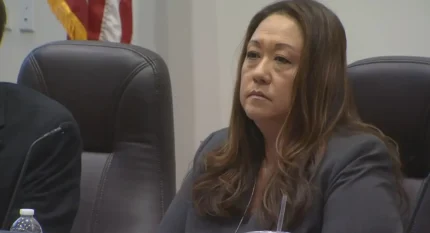The Georgia Supreme Court has ruled that a 2018 murder indictment against a white former Atlanta police officer who shot and killed a 22-year-old Black man in 2016 will stand. The decision ends a four-year halt in the case to determine the lawfulness of the deadly shooting.
On Tuesday, March 8, the state’s high court determined that James Rolfe Burns, a former officer with the Atlanta Police Department, should stand trial for the police-involved killing of Deravis Caine Rogers.

Court records show that a grand jury indicted Burns in September 2018 with crimes connected to the June 22, 2016 on-duty shooting of a Black motorist in Fulton County.
The officer suspected the deceased was involved in burglarizing cars in that area.
Eight years after the killing of Rogers, the court has determined that the officer will stand trial for felony murder, aggravated assault and two counts of violation of oath by a public officer.
After the 2018 indictment, Burns filed a “Plea in Abatement/Motion to Quash Indictment,” arguing that the state denied him his “substantive rights” connected to a change in Georgia Law that stripped certain privileges for public officials in grand jury proceedings.
Though a trial court denied the motion, the Supreme Court granted him the opportunity to apply for an interlocutory appeal.
Burns’ attorneys had hoped the indictment against his client would be tossed out, stating the ex-cop should benefit from the legal procedures under the old law versus the current law.
At the time of the shooting, Georgia law allowed officers who were the subject of grand jury proceedings to be present with their defense counsel during those proceedings where they also could make a statement to the grand jury and not face questioning by prosecutors.
After the shooting and prior to grand jury proceedings in Burns’ case, the state law was amended. With that change, officers could not have their attorney present, and if the officer made a statement, prosecutors could question the officer.
Justices reviewed the 2016 amendment to see if the law applied to his case. After assessing Burns’ argument and noting the date of the crime, the court determined that the law in question does apply to Burns, allowing them to render a decision that affirms the trial court’s judgment.
WAGA-TV Fox5 reports that days before the fatal shooting the amendment to the “Georgia Code” went into effect.
The Supreme Court commented on the change in the law and said it “merely changed the procedures for providing notice of a grand jury hearing to an accused police officer and the procedures under which an accused officer may be present.”
“Consistent with our precedent distinguishing between substantive and procedural laws, we conclude the trial court erred when it assumed that the statutes at issue are substantive rather than procedural in nature,” Justice Verda Colvin noted.
“As this Court has explained, a ‘procedural law is that law which prescribes the methods of enforcement of rights, duties, and obligations.’”
On the day of the police-involved shooting, Burns was called as a backup for another patrol car. He was tasked to find a suspicious person near an apartment complex close to Monroe Drive in Atlanta. The person was believed to be breaking into vehicles.
Rogers was driving his car when he encountered the officer.
Burns flashed his lights, turned his siren on and parked his car in front of Rogers’ vehicle. The young man tried to drive around, but to no avail. As he swerved, the cop pulled out his weapon and blasted one single shot into the passenger side of the car.
Rogers was struck in the head and died as a result of the shooting at Grady Memorial Hospital.
During an investigation regarding the shooting, Burns lied and told detectives that Rogers had tried to assault him, painting a narrative that Rogers attempted to ram his car into the officer’s and/or possibly try to run him over.
However, an internal affairs investigation determined that the young man was not trying to harm the officer and posed no foreseeable threat.
Georgia Bureau of Investigation reviewed the patrol car’s dashcam video, footage that was made available in 2020, which revealed that Rogers likely didn’t know that Burns considered him a suspect.
An attorney for Rogers’ family maintains that “evidence strongly suggests” that their deceased loved one was not connected to the break-ins Burns was called to check out.
Burns’ attorney says that his client was only trying to defend himself.
More news from our partners:


